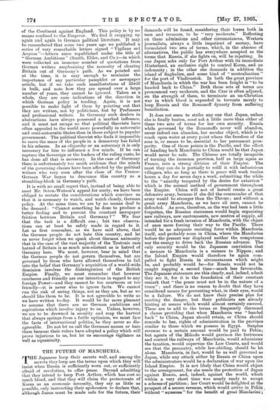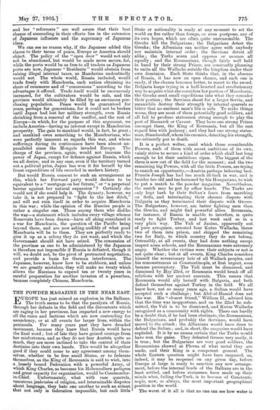THE FUTURE OF MANCHURIA.
THE Japanese keep their secrets well, and among the secrets they keep are the terms upon which they will insist when Russia is sufficiently worn out, or sufficiently afraid of revolution, to offer peace. Beyond admitting that they intend to keep Port Arthur, which has cost so much blood, and that they will claim the protectorate of Korea as an economic necessity, they say as little as possible, only instructing their spokesmen to declare that, although Japan must be made safe for the future, their demands will be found, considering their losses both in men and treasure, to be "very moderate." Reflecting on these admissions and other circumstances, Western journalists, always a little impatient of secrecy, have formulated two sets of terms, which, in the absence of alternatives, the public has everywhere accepted as the terms that Russia, if she fights on, will be rejecting. In one Japan asks only for Port Arthur with its immediate Hinterland, an exclusive right to control Korea, and an indemnity ; in the other she demands in addition the island of Saghalien, and some kind of " neutralisation ", for the port of Vladivostok. In both the great province i of Manchuria in which the war has been fought s "to be handed back to China." Both these sets of terms are pronounced very moderate, and the Czar is often adjured, on the strength of them, to terminate an un-Christian war in which blood is expended in torrents merely to keep Russia and the Romanoff dynasty from suffering humiliation.
It does not seem to strike any one that Japan, unless. she is finally beaten, must ask a little more than either of these two sets of terms for her own security. Russia while governed by the Romanoffs never will abandon, never indeed can abandon, her secular object, which is to reach open water at every point where the freedom of the seas is, or seems to be, essential to her permanent pros- perity. One of those points is the Pacific, and the effect of handing back Manchuria to China would be that Japan . would never be safe. The Chinese are totally incapable of turning the immense province, half as large again as France, into a strong division of their Empire. The most they can do is partially to refill it with industrious villagers, who as long as there is peace will work twelve hours a day for seven days a week, submitting the while to the "anarchy tempered by the desire for extortion" which is the normal method of government throughout the Empire. China will not of herself create a great defensive army, because if she did the commander of that army would be stronger than the Throne ; and without a great army Manchuria, as we have all seen, cannot be defended. As soon, therefore, as the war had been a little forgotten, the Russian statesmen would. begin organising new railways, new cantonments, new centres of supply, all, intended for a fresh invasion of Manchuria, with the object of once more forcing their way to the Pacific. There would be no adequate resisting force within Manchuria, itself, and probably none in China, where the Mandarins before the present war displayed neither the competence, nor the energy to drive back the Russian advance. The only 'security would be the Japanese conviction that a menace to Manchuria is a menace to Nippon ; and the Island Empire would therefore be again com- pelled to fight Russia in circumstances which might be, and probably would be—for Russia would not be caught napping a second time—much less favourable. The Japanese statesmen see this clearly, and, indeed, admit they see it, for it is the foundation of their constant remark that "the peace must not be in the nature of a truce" ; and there is no reason to doubt that they have considered means for preventing what, in their eyes, would be a failure. We do not know their precise plan for meeting the danger, but their publicists are already; hinting at means which would almost certainly succeed. These are to add to the terms so frequently discussed a clause providing that when Manchuria was "handed back" to China, Japan should retain, or China should concede to her, rights of administration in the province similar to those which we possess in Egypt. Surplus revenue to a certain amount would be paid to Pekin; but agents of the Mikado would garrison the fortresses and control the railways of Manchuria, would administer the taxation, would supervise the Law Courts, and would see that the peasantry, while law-abiding, should be let alone. Manchuria, in fact, would be as well governed as Japan, while any attack either by Russia or China upon the administrators would be a declaration of war upon the Island Empire. It is not likely that China would object to the arrangement, for she needs the protection of Japan against Russia, and, indeed, against the world, which within a very short time was nearly ready to accept a scheme of partition ; her Court would be delighted at the prospect of a secure revenue, which would arrive in Felon- ,. without " squeezes " for the benefit of great liandarins; and her " reformers " are well aware that their best chance of succeeding in their efforts lies in the extension of Japanese influence and the supremacy of Japanese ideas.
We can see no reason why, if the Japanese added this clause to their terms of peace, Europe or America should object. The policy of the "open door" would not only not be abandoned, but would be made more secure, for, while the ports would be as free to all traders as Japanese ports are now, Japanese " Residents " would abstain from raising illegal internal taxes, as Mandarins undoubtedly would not. The whole world, Russia included, would trade freely with Manchuria, each nation obtaining its share of commerce and of " concessions " according to the advantages it offered. Trade itself would be enormously increased, for the cultivators would be safe, and the province would ultimately be filled by an enormous pur- chasing population. Peace would be guaranteed for years, perhaps for generations, for it could not be broken until Japan had lost her military strength, even Russia shrinking from a renewal of the conflict, and the rest of Europe—in which, for the purpose of this argument, we include America—having no interest except in Manchurian prosperity. The gain to mankind would, in fact, be great ; and mankind owes something to the Manchurians, who were perfectly innocent as regards this war, and whose sufferings during its continuance have been almost un- paralleled since the Mongols invaded Europe. The charge of the province, again, would not increase the power of Japan, except for defence against Russia, which we all desire; and in any case, even if the territory turned out a political prize, Japan has won it for herself by the freest expenditure of life recorded in modern history.
But would Russia consent to such an arrangement as this, which her Forward party would declare to be equivalent to a" mortgage on her future," or "a perpetual barrier against her natural expansion " ? Certainly she would not if she could help it. The dynasty, however, we take it, is not prepared to "fight to the last ditch," and will not ruin itself in order to acquire Manchuria in this war ; while the opinion of the Russian people is rather a singular one. Those among them who dislike the war—a statement which includes every village whence Reservists have been drawn—have all along considered it a war for Manchuria, the question of the Pacific being beyond them, and are now asking audibly of what good Manchuria will be to them. They are perfectly ready to give it up as a colony they do not want, and. which the Government should not have seized. The concession of the province as one to be administered by the Japanese is therefore not impossible if Russia is defeated, though it will, we doubt not, be the pivot of protracted negotiation, and provide a basis for German interference. The Japanese, however, know how to be stubborn, and unless we are greatly mistaken,- they will make no treaty which allows the Russians to expend ten or twenty years in careful preparation for another invasion of a powerless, because completely Chinese, Manchuria.







































 Previous page
Previous page